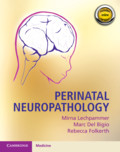Book contents
- Perinatal Neuropathology
- Perinatal Neuropathology
- Copyright page
- Contents
- Preface
- Acknowledgments
- Abbreviations
- Section I Techniques and Practical Considerations
- Section 2 Human Nervous System Development
- Section 3 Stillbirth
- Section 4 Disruptions / Hypoxic-Ischemic Injury
- Section 5 Malformations
- Section 6 Perinatal Neurooncology
- Section 7 Spinal and Neuromuscular Disorders
- Arthrogryposis
- Chapter 49 Arthrogryposis Multiplex Congenita
- Spinal Muscular Atrophy
- Early-Onset Hereditary Neuropathies
- Congenital Muscle Disorders
- Section 8 Eye Disorders
- Section 9 Infections: In Utero Infections
- Section 10 Metabolic / Toxic Disorders: Storage Diseases
- Section 11 Forensic Neuropathology
- Appendix 1 Technical Considerations in Perinatal CNS
- Index
- References
Chapter 49 - Arthrogryposis Multiplex Congenita
from Arthrogryposis
Published online by Cambridge University Press: 07 August 2021
- Perinatal Neuropathology
- Perinatal Neuropathology
- Copyright page
- Contents
- Preface
- Acknowledgments
- Abbreviations
- Section I Techniques and Practical Considerations
- Section 2 Human Nervous System Development
- Section 3 Stillbirth
- Section 4 Disruptions / Hypoxic-Ischemic Injury
- Section 5 Malformations
- Section 6 Perinatal Neurooncology
- Section 7 Spinal and Neuromuscular Disorders
- Arthrogryposis
- Chapter 49 Arthrogryposis Multiplex Congenita
- Spinal Muscular Atrophy
- Early-Onset Hereditary Neuropathies
- Congenital Muscle Disorders
- Section 8 Eye Disorders
- Section 9 Infections: In Utero Infections
- Section 10 Metabolic / Toxic Disorders: Storage Diseases
- Section 11 Forensic Neuropathology
- Appendix 1 Technical Considerations in Perinatal CNS
- Index
- References
Summary
Arthrogryposis multiplex congenita (AMC), or arthrogryposis, and multiple congenital contractures (MCC) are equivalent terms used to describe a phenotypic condition associated with multiple congenital non-progressive contractures in three or more body sites. Arthrogryposis is not a single disease but rather a clinical feature associated with more than 300 conditions [1]. The contractures develop secondary to fetal akinesia, i.e., in utero movement limitation, of varying etiology: muscle and/or neuronal pathology, connective tissue abnormalities, external limitations of in utero space, maternal diseases or exposures, compromised blood supply of placenta and/or fetus, metabolic disorders, and epigenetic influence. Children are born immobilized with fixed and thickened joints and decreased muscle mass. Early medical care may improve the condition over time [1, 2].
- Type
- Chapter
- Information
- Perinatal Neuropathology , pp. 301 - 304Publisher: Cambridge University PressPrint publication year: 2021



